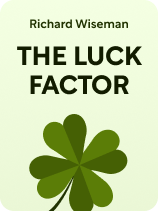

This article is an excerpt from the Shortform book guide to "The Luck Factor" by Richard Wiseman. Shortform has the world's best summaries and analyses of books you should be reading.
Like this article? Sign up for a free trial here.
Do you believe in luck? How does luck work? Is there a scientific explanation for luck?
In his book, The Luck Factor, psychologist Richard Wiseman set out to test whether or not luck could be proven scientifically. He determined that there are four psychological factors that lucky people unknowingly engage in to increase their chances of success and satisfaction.
Keep reading to learn about each factor.
How Luck Works
The first thing that Wiseman makes clear is that too many people have had repeated good or bad luck in their lives for all their experiences to be random or imagined. Therefore, as a psychologist, he approaches the problem in terms of belief and behavior. So, how does luck work? What he’s found in his research is that people who identify as having good or bad luck tend to act in ways that produce results that confirm their expectations.
(Shortform note: In health care, the power of positive expectations that Wiseman talks about is called the placebo effect, when your body reacts positively to a neutral substance that you think is medication. One reason why placebos might work is taking a placebo you believe will make you healthier may spur you to adopt other healthy behaviors, such as exercise and making better food choices. The opposite of a placebo—when someone is told a drug will cause harm, whether or not that’s the case—is called the nocebo effect, which can produce a measurable reduction in health and negate medication’s positive effects, much as Wiseman says that belief in bad luck can prompt poor decisions that actually bring it about.)
Wiseman also investigated what other factors might determine someone’s luck. For instance, he administered intelligence tests to self-identified lucky and unlucky study participants, but he found no correlation between being smart and being lucky. Likewise, he tested whether some form of psychic ability played a role in luck by recruiting lucky and unlucky test subjects to predict lottery numbers. In this case, he found that in a truly random scenario, people who think they’re lucky do no better than anyone else. Nevertheless, the “lucky” participants had higher expectations of winning, and while optimism didn’t improve their odds, Wiseman believes that such expectations could influence their lives in other positive ways.
(Shortform note: In The Psychology of Money, Morgan Housel writes that the danger in both ignoring and relying on luck is that most of us don’t really understand how large a role luck plays in our lives. The reason is simple—it’s hard to statistically analyze the relative risk of most decisions we make. Meanwhile, we generally attribute our own failures to bad luck and other people’s failures to poor decisions. Therefore, we try to learn how to succeed by studying exceptional success stories without acknowledging how much blind luck played a role. Housel recommends that when learning from successful people, you should look at patterns instead of individual successes, which is essentially the basis for Wiseman’s research in this book.)
Establishing a scientific basis for luck is good news for everyone because in science, results are reproducible. Wiseman suggests that by consciously adopting the attitudes and behaviors of lucky people, we can all improve our chances in life, at least in those areas that our thoughts and actions can impact. In contrast, unlucky people rarely have positive experiences, make poor decisions, don’t reach their goals, and buckle under setbacks—all because they actively believe the world is out to get them. Study after study has shown that thoughts and behaviors determine how we experience the world, and reframing your outlook can measurably improve your life. Wiseman says it improves your luck as well.
(Shortform note: Wiseman’s recommendations on how to change your ways of thinking and acting may be hard to implement because of how deeply ingrained your current attitudes and behaviors are. In Psycho-Cybernetics, Maxwell Maltz explains that even if you decide to adopt a new belief or habit, your subconscious may actively work against you because it has a different belief system than your conscious mind. To rewire your brain to a luckier mindset takes practice and repetition, a process that Maltz says you can achieve by focusing on the end result you want and engaging in imaginative visualization. With enough work, your subconscious’s automatic beliefs and responses can align with the new thoughts and actions you desire.)
Wiseman identifies four main psychological factors that lucky people unknowingly engage to increase their chances of success and satisfaction—they believe that life will work out in their favor, they follow their instincts, they grab opportunities, and they turn any setbacks into platforms for growth.
Factor 1: Believing in Luck
The first psychological characteristic that defines both lucky and unlucky people is that they believe they’re lucky or unlucky. Put another way, some people look to the future favorably, while others see only doom and gloom. Whichever side of the line you fall on, you probably attribute your beliefs to past experience without realizing the degree to which your expectations shape your experience. Wiseman writes that a positive outlook—feeling “lucky”—energizes how you tackle the future in ways that a negative outlook cannot.
Playing the Numbers
Wiseman notes that people who feel lucky don’t see luck as a one-time occurrence. For instance, if they make a new friend at a sporting event by striking up a conversation with a stranger, they’ll tend to repeat that behavior in the future, expecting a similar outcome and statistically raising the chances of one. Wiseman finds that this type of positive belief is so ingrained in lucky people that even when their hopes aren’t met, they view it as a temporary glitch. Conversely, people who feel they’re unlucky expect something bad to follow anything good—if they meet one friendly person, they expect the next one to be a jerk. Therefore, they won’t seek to recreate a past success, preventing any possible good luck in the future.
Another point to consider is that people who believe in their own luck are more persistent than those who think that luck is against them. Wiseman’s research shows that self-proclaimed lucky people are more likely to enter competitions, spend more time trying to solve difficult problems, and pursue challenging career opportunities. Their belief in their luck makes them lucky in the sense that it gives them more time and opportunities to succeed. On the other hand, people who expect disappointment will actively minimize their chances for success by avoiding situations in which they might lose, from poetry contests to job interviews. The cumulative effect of persistence—or its lack—will self-confirm your beliefs about your luck.
Networking for Luck
Wiseman’s final point about believing in your luck is that people who expect lucky outcomes in life tend to be more positive when they interact with others. As a result, others are more positive in return, increasing your chances of making new friends, networking with your peers, and making lucky connections that can enhance your life. For instance, suppose your roof starts to leak. If you’re a lucky-minded person, you’re more likely to connect and be open with many people, raising the odds of meeting someone who knows a roofer willing to give a discount to their friends. Your belief in luck makes having luck more likely, which will only reinforce your beliefs and create more opportunities for random chance to turn in your favor.
Factor 2: Trusting Your Feelings
The next commonality that Wiseman discovered is that people who think of themselves as lucky tend to trust their intuition more than those who don’t. As a result, they enhance their luck by making, on average, better decisions—both in their personal and professional lives—and are more likely to engage in activities that improve their intuitive skills.
Wiseman says there’s nothing magical about intuition and gut feelings. Rather, hunches and instincts are often the result of your brain’s unconscious pattern recognition skills. A great deal of psychological research has shown that our unconscious minds influence our choices, and our brains developed to work that way for a reason. Intuitive hunches are one way that our brains streamline the decision-making process, and Wiseman’s research found that unlucky people often ignore the warning signals their intuition sends them, whereas people who seem to have luck on their side are more willing to follow their instincts.
Wiseman cites numerous case studies demonstrating that people who follow their hunches fare better in personal relationships, career choices, and financial decisions. For instance, if you meet someone on a blind date, you may immediately feel an energetic connection—or you might feel that something’s “off” about the person. The same scenario may come up during a job interview—you might get a positive feeling about the other person, or something in the back of your mind might tell you that they’re not someone you want to work with. When following these hunches leads to a good decision, you might attribute your outcomes to luck when in fact your unconscious was just doing its job.
Intuition Is a Muscle
Unconscious intuition—like any other skill—requires exercise and practice to grow stronger. In his research, Wiseman discovered that in addition to using their intuition more frequently, lucky people actively take steps to enhance their intuition, whether they realize it or not. They do this by practicing meditation, finding quiet places for contemplation, and regularly clearing their minds in other ways to boost their intuitive skills. In surveys, these individuals report how these techniques have improved their decision-making abilities and overall luck in various aspects of their lives. Therefore, Wiseman concludes that lucky people treat their intuition as a valuable tool and make a point of fostering and listening to their feelings.
Factor 3: Seizing Lucky Moments
The third factor Wiseman identifies is that lucky people recognize potentially lucky moments and immediately take action when they happen. Once again, this form of luck isn’t magic, but rather stems from certain people’s psychological makeup—they tend to be extroverts who are open to new experiences.
Wiseman writes that extroverts, by their nature, meet many people and put energy into maintaining long-term relationships. The extensive social network an extrovert creates dramatically increases their chances of beneficial chance meetings and connections. Therefore, if you’re looking for a job, a romantic partner, or just a good plumber to work on your house, and you have a wide network of connections, your odds are much higher of “lucking into” someone who can help you. The more contacts you have, the better your odds—extroverts create luck through simple mathematics.
Relaxing Into Luck
However large your circle, you have to be open to grabbing chances when they come, and a relaxed approach to life can help with that. Wiseman’s research shows that lucky people tend to have a relaxed attitude and an openness to new experiences. People with lower anxiety are more likely to view chance occurrences with less suspicion, seeing them as opportunities instead of dangers. Likewise, people who seek out new experiences expose themselves to a broader range of opportunities than people who stay in safe, familiar patterns. In short, lucky people’s relaxed approach to life lets them capitalize on opportunities that others overlook. Being “lucky” in this sense simply means staying open to the world around you.
Factor 4: Reversing Your Luck
Despite the strategies listed above, luck is still largely a matter of chance, so why don’t “lucky people” have as much bad luck as good? The secret is that they do—but Wiseman points out that people who identify as lucky turn their bad luck around by recasting it in a positive light. They achieve this via several techniques such as reframing situations, avoiding rumination, and taking precautions to prevent bad luck from repeating itself in the future.
Seeing bad luck in a good light isn’t easy, but Wiseman explains that many of his “lucky” research subjects make a habit of imagining how the bad things that happen could have been even worse. For example, suppose you get really sick just before a big convention you’d looked forward to attending. Though anyone would be understandably upset, a lucky-minded person might imagine how much worse it would have been to get sick right before the vacation they’d planned for one month later instead. Wiseman argues that this type of perspective helps lucky people maintain a more positive outlook even on unpleasant experiences.
Another trait Wiseman discovered is that lucky people let go of past misfortunes and focus on the future. As stated before, lucky people tend to have faith that circumstances will generally get better over time, whereas many psychological studies have shown that ruminating on the past can create a downward spiral of negative emotions and memories. By keeping an eye on the long-term future, many of the lucky people in Wiseman’s research attributed unexpected benefits to the seemingly unfortunate events in their lives. For instance, a flat tire might make you late for work, but it could also lead to meeting a good mechanic who you come to rely on for maintenance and repairs.
Bad Luck Is a Teacher
The last commonality that Wiseman uncovered was that lucky people view any bad luck as a learning opportunity. Instead of giving up when something bad happens, a lucky-minded person will ask why things went wrong and what they can do to improve their odds in similar situations. For example, you might ask why your tire blew out—had you gone too long without having it checked? Lucky people’s proactive approach to bad luck helps them minimize the chances of experiencing it again and often leads to creative solutions to the problems caused by their current misfortune. On the other hand, Wiseman finds that unlucky people tend to chalk their bad luck up to sheer chance and don’t make as much of an effort to prevent it.

———End of Preview———
Like what you just read? Read the rest of the world's best book summary and analysis of Richard Wiseman's "The Luck Factor" at Shortform.
Here's what you'll find in our full The Luck Factor summary:
- The unconscious methods lucky people use
- The benefits of trusting your intuitive hunches
- The scientific explanation as to whether or not luck is real






